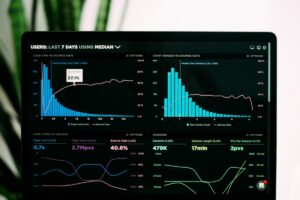The Advantages Of A Business Dashboard
In today’s fast-paced business arena, where every moment counts and every decision can make or break success, imagine having a powerful tool at your fingertips that transforms complex data into a clear and colorful masterpiece. Enter the business dashboard, the superhero of the modern corporate world. With the simplicity of a glance, it unveils real-time insights, breaks down barriers, and guides leaders on their quest for triumph. Buckle up as we embark on a journey through the captivating advantages of this dynamic data-driven ally.
Real-Time Insights:
 In the fast-paced world of business, having access to real-time insights is akin to having a crystal ball that reveals the immediate future. Business dashboards serve as this magical crystal ball, offering instant access to critical data. These dashboards are meticulously designed to present up-to-the-minute information in a user-friendly format, empowering organizations with the agility they need to respond swiftly to market changes and capitalize on emerging opportunities.
In the fast-paced world of business, having access to real-time insights is akin to having a crystal ball that reveals the immediate future. Business dashboards serve as this magical crystal ball, offering instant access to critical data. These dashboards are meticulously designed to present up-to-the-minute information in a user-friendly format, empowering organizations with the agility they need to respond swiftly to market changes and capitalize on emerging opportunities.
Imagine a scenario where a retail company relies on its business dashboard to monitor daily sales performance. With real-time data at their fingertips, they can spot trends and patterns as they unfold throughout the day. If a particular product suddenly starts flying off the shelves, they can quickly reorder to meet the demand, ensuring they don’t miss out on potential revenue. Conversely, if sales of another product plummet, they can investigate the issue promptly, perhaps adjusting pricing or marketing strategies. This ability to make decisions based on current, accurate information is a game-changer in today’s competitive landscape.
Real-time insights aren’t limited to sales data alone. They extend across various facets of a business, from inventory levels to website traffic, customer feedback, and financial performance. This holistic view of an organization’s operations empowers decision-makers to act promptly, optimize processes, and stay ahead of the curve.
Data Centralization:
Data is the lifeblood of any modern business. However, in the absence of an efficient system for managing and accessing this data, organizations can quickly find themselves drowning in a sea of information. This is where the concept of data centralization, facilitated by business dashboards, comes to the rescue.
Business dashboards serve as a centralized hub that consolidates data from diverse sources into one location. This is a revolutionary approach to data management. Instead of juggling multiple reports, spreadsheets, and databases, decision-makers can turn to a single, easily navigable dashboard for all their information needs.
Consider a multinational corporation with operations in multiple regions. Each region may have its own data sources, reporting formats, and systems. Without centralization, executives at the headquarters would face a Herculean task trying to make sense of this scattered data. However, with a well-implemented business dashboard, data from various regions can be harmoniously integrated. This not only saves time and reduces the risk of errors associated with manual data consolidation but also fosters data consistency. Everyone across the organization is working with the same data, eliminating discrepancies and ensuring that decisions are based on accurate information.
Centralization streamlines information access. Decision-makers can effortlessly retrieve the specific data they require, whether it’s sales figures from a particular region, inventory levels for a specific product line, or customer feedback trends. This efficiency in data retrieval enhances productivity and supports more informed decision-making.
Informed Decision-Making:

In the complex world of business, informed decision-making is the cornerstone of success. The ability to quickly analyze and understand data trends, anomalies, and performance metrics is a competitive advantage that modern organizations can’t afford to overlook. Business dashboards play a pivotal role in this process by providing visually appealing and easily digestible data representations that empower decision-makers to make more informed and effective choices.
Imagine you’re the CEO of a rapidly expanding e-commerce company, and you’re faced with a crucial decision regarding inventory management. With a well-designed dashboard, you can view real-time data on sales, customer behavior, and inventory levels in one intuitive interface. Color-coded charts, graphs, and key performance indicators (KPIs) instantly convey the information you need. You notice that a particular product category has experienced a surge in demand, but inventory levels are dwindling. Armed with this insight, you can promptly allocate resources to restock this product, preventing stockouts and capitalizing on the trend.
The beauty of a business dashboard lies in its ability to cut through the noise and distill complex data into actionable insights. Decision-makers don’t need to sift through spreadsheets or rely on data analysts to interpret information; they can see the story the data is telling at a glance. This real-time awareness allows for quicker responses to emerging opportunities and challenges, ultimately driving business growth and resilience.
Dashboards can be customized to suit specific business needs. Different departments within an organization can have tailored dashboards that focus on the metrics most relevant to their functions. This ensures that decision-makers across the company have access to the data that directly impacts their areas of responsibility, further enhancing the quality of decision-making at all levels.
Goal Tracking:
 In the pursuit of organizational excellence, setting and tracking goals is paramount. Business dashboards excel in this aspect by providing a platform for the systematic monitoring of performance against predefined objectives. This goal-oriented approach not only promotes accountability but also motivates teams and nurtures a culture of continuous improvement.
In the pursuit of organizational excellence, setting and tracking goals is paramount. Business dashboards excel in this aspect by providing a platform for the systematic monitoring of performance against predefined objectives. This goal-oriented approach not only promotes accountability but also motivates teams and nurtures a culture of continuous improvement.
Let’s consider a scenario in which a software development company sets a goal to reduce customer-reported software bugs by 20% in the next quarter. Without a dashboard, tracking progress towards this goal could be a cumbersome and time-consuming task. However, with a goal tracking dashboard, the development team can monitor bug reports, resolutions, and their impact on customer satisfaction in real-time.
This real-time visibility into progress fosters accountability. Team members are acutely aware of their performance in relation to the established goal. If they notice that bug reports are not decreasing as expected, they can take immediate corrective action, such as adjusting their development processes or allocating more resources to quality assurance. The dashboard becomes a constant reminder of the goal, keeping it top of mind and driving a sense of ownership and responsibility among team members.
The motivational aspect of goal tracking should not be underestimated. As teams see their progress in real-time, they gain a sense of accomplishment and purpose. Achieving milestones along the way to a larger goal boosts morale and encourages a sense of collective achievement. This positive reinforcement fuels a culture of continuous improvement, where teams are driven to exceed their goals and contribute to the overall success of the organization.
Transparency and Communication:
 Transparency is the foundation of trust in any organization. Business dashboards serve as powerful tools for fostering transparency by enabling the sharing of performance data among employees, stakeholders, and clients. This open and honest approach to information sharing encourages collaboration and effective communication, ultimately enhancing the overall health and productivity of the organization.
Transparency is the foundation of trust in any organization. Business dashboards serve as powerful tools for fostering transparency by enabling the sharing of performance data among employees, stakeholders, and clients. This open and honest approach to information sharing encourages collaboration and effective communication, ultimately enhancing the overall health and productivity of the organization.
Within the realm of internal communication, business dashboards act as a bridge connecting different departments and teams. Imagine a scenario in which a marketing team shares their campaign performance metrics on a dashboard accessible to the sales team. With this shared visibility, sales representatives can see which marketing efforts are generating leads and conversions in real-time. This knowledge empowers them to align their sales strategies with the marketing initiatives that are driving results, leading to a more synchronized and efficient workflow.
Externally, dashboards can be shared with stakeholders and clients to provide a transparent view of a company’s performance. This transparency instills confidence in investors, partners, and customers. They can see firsthand how the organization is performing, which in turn fosters trust and strengthens business relationships. Clients, for instance, appreciate being able to track project progress and performance through a dashboard, as it enhances transparency and ensures that expectations are met.
Effective communication is at the heart of successful collaboration, and dashboards facilitate this by providing a common platform where all stakeholders can access and interpret data in a clear and standardized manner. This eliminates misunderstandings and reduces the need for time-consuming back-and-forth communication. Instead, stakeholders can focus their discussions on actionable insights derived from the shared dashboard data, driving more meaningful and productive interactions.
Resource Optimization:
 Resource allocation is a critical aspect of business management, and the efficient utilization of resources can make or break an organization’s success. Business dashboards play a pivotal role in optimizing resource allocation by helping organizations identify inefficiencies and allocate resources more effectively. This optimization not only leads to cost savings but also improves operational efficiency.
Resource allocation is a critical aspect of business management, and the efficient utilization of resources can make or break an organization’s success. Business dashboards play a pivotal role in optimizing resource allocation by helping organizations identify inefficiencies and allocate resources more effectively. This optimization not only leads to cost savings but also improves operational efficiency.
Consider a manufacturing company with multiple production lines. Without a dashboard, it can be challenging to monitor the performance of each line in real-time. However, with a dashboard that displays key production metrics, such as machine uptime, defect rates, and production output, the company can quickly identify underperforming lines. By reallocating resources, such as skilled operators or maintenance personnel, to address these issues promptly, the company can minimize downtime, reduce waste, and maximize production efficiency.
Resource optimization extends beyond production lines and encompasses areas such as workforce management, marketing budget allocation, and inventory control. In each case, dashboards provide a clear and holistic view of resource utilization, enabling decision-makers to make data-driven adjustments as needed. For instance, a retailer can use a dashboard to monitor inventory turnover rates. If certain products are languishing on the shelves, they can adjust their purchasing and marketing strategies to optimize inventory levels and free up capital for more profitable investments.
The cost savings achieved through resource optimization are not just a one-time benefit; they have a lasting impact on an organization’s bottom line. By consistently identifying and rectifying inefficiencies, businesses can operate leaner and more competitively, freeing up resources for strategic initiatives and growth opportunities.
Competitive Edge:
 In today’s rapidly evolving business landscape, gaining a competitive edge is paramount to long-term success. Business dashboards serve as a catalyst for achieving this edge by enabling organizations to leverage data effectively. This data-driven approach empowers agile decision-making and the ability to adapt swiftly to market changes, positioning the organization for success in a dynamic business environment.
In today’s rapidly evolving business landscape, gaining a competitive edge is paramount to long-term success. Business dashboards serve as a catalyst for achieving this edge by enabling organizations to leverage data effectively. This data-driven approach empowers agile decision-making and the ability to adapt swiftly to market changes, positioning the organization for success in a dynamic business environment.
The competitive edge begins with the ability to make informed decisions in real-time. Consider a tech startup operating in a highly competitive market. With a dashboard tracking user engagement and customer feedback, the company can quickly identify trends and user preferences. If they notice a drop in user engagement with a particular feature, they can prioritize updates and improvements to stay ahead of the competition. The ability to respond rapidly to user needs and market dynamics keeps the company at the forefront of innovation.
Dashboards provide the means to monitor key performance indicators (KPIs) that are directly aligned with strategic objectives. This alignment ensures that the organization is always working towards its goals. For instance, a financial institution can track customer acquisition costs and lifetime value through a dashboard. By continuously optimizing its marketing efforts based on these metrics, the institution can gain a competitive advantage by acquiring high-value customers more efficiently than its peers.
The competitive edge gained through dashboards is not static; it’s an ongoing process of improvement and adaptation. As market conditions change and new opportunities emerge, organizations with a data-driven mindset can pivot and capitalize on these developments. This agility is a key factor that separates industry leaders from followers, allowing them to maintain a dominant position in their respective markets.
Final thoughts
As we draw the curtain on our exploration of the business dashboard, one thing is abundantly clear: it’s not just a tool; it’s a game-changer. With its real-time magic, streamlined centralization, and a visual language that speaks volumes, it propels businesses toward their goals with unwavering precision. In an era where success hinges on the speed of decisions, the business dashboard is your trusty steed, carrying you swiftly towards victory in the ever-evolving arena of business competition. Embrace it, harness its power, and watch your organization soar to new heights.
Dive deep into insights, tips, and the latest trends delivered straight to your inbox. Unlock exclusive content, be the first to know about our exciting updates, and join a community that thrives on innovation and growth.
Sign up for our newsletter now and never miss a beat in the dynamic world of business!
Subscribe Here:
We value your time and inbox space. Expect only the best from us, no spam included!

